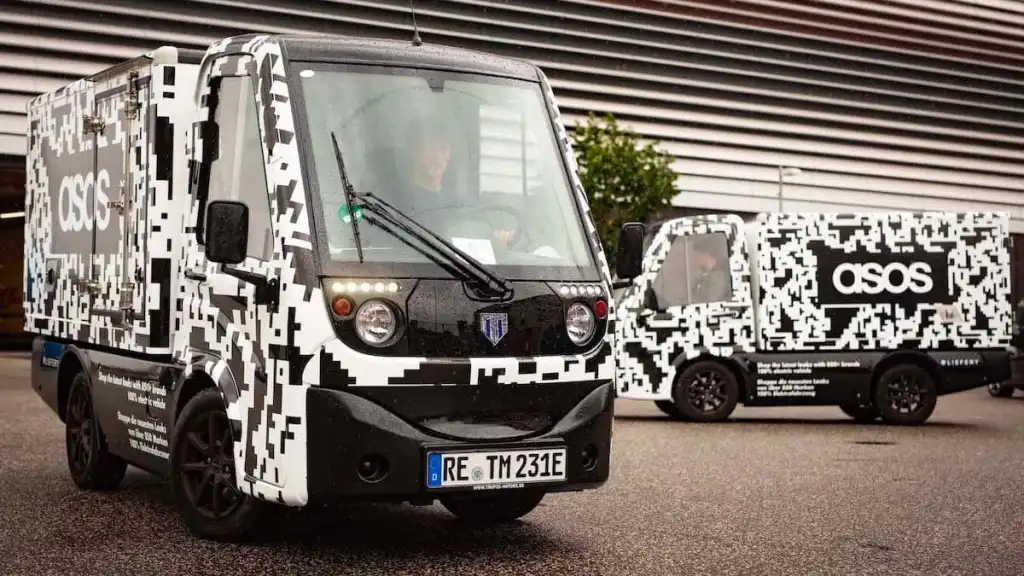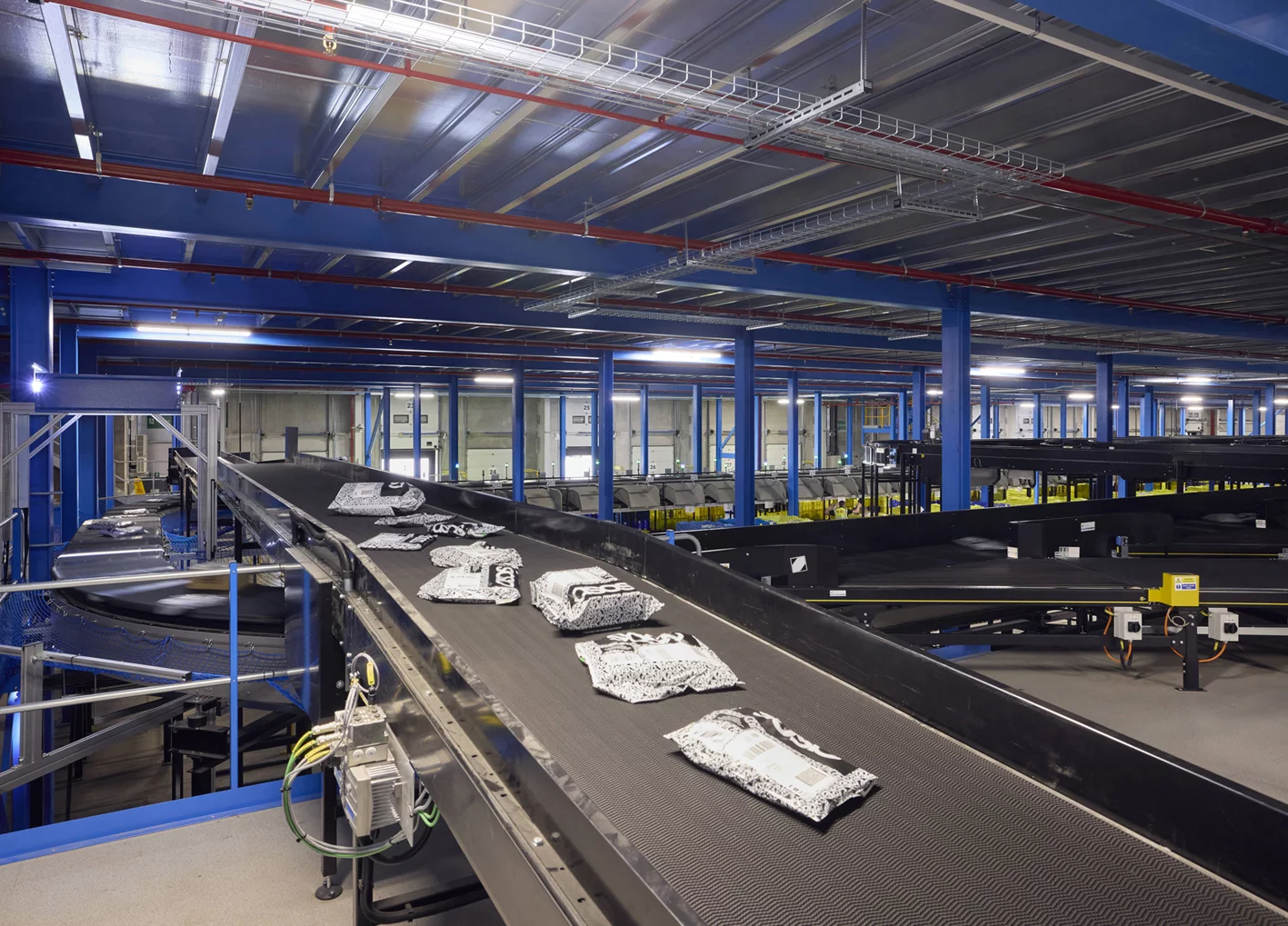When online fashion retailer ASOS embarked on setting up its fourth fulfilment centre, the company turned to tried and trusted materials handling partner, BS Handling Systems. ASOS took possession of the keys for the 437,000 sq. ft. Lichfield, UK, warehouse in January 2021 and had less than eight months to make the site fully operational by August of that year to support the Black Friday peak in November.
“In October 2020 we began a very rigorous tender process to identify suppliers who would not only deliver competitive and high quality solutions, but also work as part of a team in a flexible, adaptable and responsive manner,” explains Gary Beveridge, Director of Supply Chain Development for ASOS. Having previously worked with BS Handling Systems on a number of major projects, it was clear that they would be able not only to deliver the right solution, but also to adapt to the inevitable design changes that pop up as a project of this nature progresses.
“The first phase of BS Handling Systems’ support provided the major conveyor and despatch sorter elements. Later followed design and installation of additional smaller works including our secure caged area for high value items such as jewellery and belts; a hanging garment storage system that transports inbound goods on hangers (GOH) from goods in up to the top floor of the pick tower, and a conveyor solution to get waste cardboard boxes from all five storage floors of the pick tower out to the waste skips in the yard.”
Storage capacity of around 7 million units of stock
The site go-live was planned for August 2021, providing a storage capacity of around seven million units of stock and outbound capacity of a million units of stock shipped on customer orders each week. BS Handling Systems was responsible for creating the conveyor ring which helps move 1200 inbound cartons or returns totes, as well as
1200 outbound totes an hour through the pick tower. In addition, the company had to design, build and install a high speed despatch sorter with a capacity to handle up to 14,000 parcels an hour.
New stock, in cartons, is unloaded from delivery trucks and placed on the inbound conveyor system. This transports stock through two DWS (Dimensioning-Weighing-Scanning) systems and ultimately to its storage location in shelving on one of four put away zones on each of five storage floors of the pick tower. Outbound picked items are placed in colour coded totes – black for multiple orders and green for singles – these totes are transported down to one of four outbound tote sortation zones on the ground floor.
From here, the totes are delivered to one of four packing lines which BS Handling Systems designed and installed. Each line comprises of 20 packing benches and a conveyor with DWS systems to transport the packed goods to the despatch sorter inducts or direct to the loose load trailer despatch line. Four 2 x 2 Intralox ARB sorters – one per infeed line – divert the product to one of two banks of high-speed sorter inducts which merge the packages onto the despatch sorter or direct to the loose load trailer line.
Versatile high speed despatch sorter
The despatch sorter had to be capable of handling a wide range of package sizes and weights, from small items such as jewellery right up to large boxes with coats or pairs of boots. It had to be able to handle these varying sizes rapidly without error, as the long-term capacity target is four and half million units going out to customers each week during peak.
BS Handling Systems also designed and built a waste cardboard box removal system. This consisted of three steel chutes running from the top floor of the pick tower down to the first floor where the boxes dropped onto a dunnage conveyor belt taking them out to the automatic waste baler in the yard.
To avoid blockages occurring in the steel chutes, BS Handling Systems designed a clever, but simple ‘traffic light’ system at each input station on every chute. When arriving at the chute, the light is red and the operatives cannot put waste down the chute. The operator presses the ‘request use’ button, and once the light turns green they have a set period of time to safely dispose of the waste down the chute – locking out the other floors. This avoids too many boxes going down the chutes at one time and either blocking the chutes or over-loading the conveyor at the bottom.
The project also required BS Handling Systems to design and install a conveyor system that enabled the unloading and loading of goods from and into truck trailers. The solution included six man rider telescopic boom loaders; these booms improved the efficiency of unloading and loading goods directly from or into the back of the trailers.
A true partnership founded on a ‘can-do’ attitude
Beveridge added, “the team at BS Handling Systems did a fantastic job throughout. They are exceptionally easy to deal with and very responsive, always demonstrating a ‘can-do’ attitude. Without hesitation, they are willing to go ‘above and beyond’ to make sure that the end product delivered to ASOS is absolutely the best we can achieve. They now have a team of ten engineers on site providing 24/7 maintenance for the facility; this team works closely with GXO who run the operation for us. The maintenance team has integrated really well into our structure here in Lichfield. They have their own caged area on the ground floor with all the spares required to ensure we can keep the fulfilment centre running.”
More than just a supplier
“Rob, Stephen and the BS Handling Systems team have worked with ASOS for a long time and we consider them more than just a supplier. The timelines we had to achieve here at Lichfield were tight and it was comforting to know that we could trust BS Handling Systems not only to do a really professional job, but also to go above and beyond whenever it was necessary. There’s no question that, however challenging, they will always do what’s best for ASOS,” concludes Beveridge.






